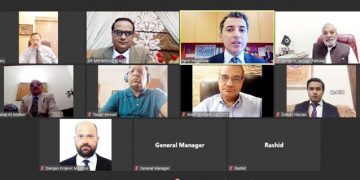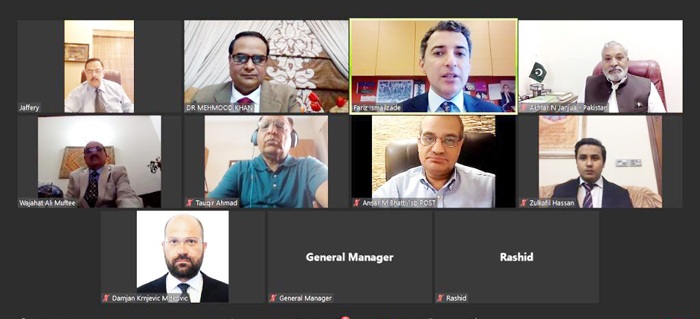– Dr Fariz Ismailzade, highlighted the real ground reality about the ongoing unfortunate war between Russia and Ukraine and emerging Regional Security Challenges.
– Dr Mehmood ul Hassan Khan said that the confrontation has exposed various faulty lines in the prevailing system of international politics
– Brig. Akhtar Nawaz Janjua opined that the conflict had a history which is extremely dangerous, from security, economy and world peace prospective
– Dr Damjan Krnovic clearly spelled out that energy supplies in terms of oil & gas would be the prime target of the war and that sanctions against Russia would backlash
– Ukraine is crucial for Russia as well as for parts of Europe which makes it a location of rivalry between the EU, the US. and Russia, opines Maj.Gen.(R) Wajahat Mufti
By Riaz A Malik
The Center for South Asia and International Studies (CSAIS) Islamabad arranged an international conference on the burning issue of “Russia-Ukraine War & Changing Socio-Economic, Geopolitical and Geostrategic Scenario in which speakers from brotherly country Azerbaijan scrupulously participated. It was moderated by Dr Mehmood ul Hassan Khan, Director CSAIS, Islamabad.
In his opening remarks Dr Fariz Ismailzade of Institute of Development & Diplomacy Baku appreciated efforts of the Center for South Asia and International Studies (CSAIS) for its tireless efforts to make bridges of trust and better understanding between different regions. Dr Fariz hoped that this conference would bring more clarity among the community of intellectuals, researchers and media outlets.
On his part, Maj. General Khalid Amir Jaffri (Retired) the President CSAIS Islamabad welcomed all the distinguished speakers from Pakistan and Azerbaijan and hoped that this conference would be first step towards better understanding of conflicting realities in terms of socio-economy, geopolitics and geostrategic orientations.
While addressing the larger number of virtual audiences Dr Fariz Ismailzade, highlighted the real ground reality about the ongoing unfortunate war between Russia and Ukraine and Regional Security Challenges. His speech was sweet, short and smart which covered all aspects of regional security ramifications from the ongoing Russia-Ukraine war.
Dr Fariz showed serious concerns about Kremlin policy of regional annexation and expansion which raised very serious concerns among the regional countries. Dr Fariz precisely shared past misadventures of Russia which created panic and chaos among the regional countries. Azerbaijan government urged all the parties to give peace a chance to avert larger war in the region he added. He showcased his country immense humanitarian assistance to people of Ukraine to lessen their sufferings. Even the State Oil Company of the Azerbaijan Republic (SOCAR) has extended free supply of oil to Ukrainian transporters which showed Azerbaijan’s good spirits towards its neighbouring country.
In his detailed analysis, Dr Mehmood ul Hassan Khan highlighted that confrontation of geopolitics in the ongoing war between Russia and Ukraine had exposed various faulty lines in the prevailing system of international politics. Unilateral violations of international laws in the past by the US and its allies have now haunting them.
While talking about roles of different stakeholders he shared that regional economies have been in the line of fire since the start of this unfortunate tussle in which US, EU and NATO have played very destructive maneuverings and manipulations. Its slipover ramifications have badly damaged chain supplies of various commodities and production channels around the world. Moreover, unilateral impositions of sanctions against Russia have multiplier socio-economic, geopolitical and geostrategic implications.
Dr Khan feared that the EU strategic switching from oil & gas to renewables would not be materialized very soon. In this regard, despite rotary of the EU senior leadership, Germany has affected the most. Its industrialization process has been halted and dusted because of disruption in Russian gas supplies he added.
He concluded that Chinese Foreign Minister Wang Yi strived hard to persuade the EU leadership to give peace a chance. Chinese peaceful persuasions to resolve the Ukraine crisis vividly reflects its century old philosophy of immortal peace which has comparative advantage over false and fake propaganda of the US and the west he added.
Dr Mehmood added that real power politics was at its peak in which world is now swinging between Ukrainian comedy of errors and Russian roulette. Thus Chinese Philosophy of immortal Peace has the capacity to achieve wonders to wrap the wings of war fighters and stop warmongering.
The second session was about “Russia-Ukraine War: Impacts on Oil & Gas Industry and Chain Supplies’ in which Brig. Akhtar Nawaz Janjuna, Senior Member Board of Director, CSAIS talked about “Russia-Ukraine War and Conflicting Energy Security Scenarios”. Brig. Nawaz speech covered all possible aspects of history pertaining to imperialistic forces euphoria and justification of various misadventures. Cold war era followed, and with that at-will incursions, interventions, imposition of ideologies, mad race for weapons of mass destruction (and don’t get me wrong these were all real unlike the fake lies mounted pseudo Iraqi WMDs) all jam-packed Brig Nawaz added.
While delivering a detailed speech Brig Nawaz shared that last decade of the 20th century saw the emergence of the unipolar world along with no-holds-barred reign of terror both state sponsored and non-state actors’ driven.
He opined that Russia-Ukraine-Conflict had a history, first recorded conflict was in 9th century, since then these two states have seen many more. They have been part and apart. He termed that ongoing war extremely dangerous, from security, economy and world peace point of view.
He pinpointed that this Russia-Ukraine Conflict was mainly due to the US designs of expanding the NATO towards east with many WARSAW Pact countries already onboard and Ukraine on the threshold raised the legitimate security concerns for Russia and the Region.
He feared that the current crisis is likely to have a major impact on price levels. EU gets its gas from a number of sources, with pipeline gas from Russia, Norway and the Netherlands meeting most of Europe’s gas needs. In addition, there is pipeline supply from North Africa and some capacity for sourcing liquefied natural gas from the global market he further added.
Brig Nawaz concluded that future belonged to East hence it is time to realize the potential, preeminence and role of the East. United approach by Asia & Eurasia is the need of the hour. Organizations like SCO should play a major role in regional as well as world affairs and termed peace the key to prosperity.
Dr Damjan Krnovic, Director of Policy Research and Publications, the Institute of Development & Diplomacy Baku talked about “the Geopolitics of Energy and the Conflict over Ukraine”. in which the distinguished speaker from our strategic partner Azerbaijan shared different short, medium and long term socio-economic and geopolitical effects of ongoing Russia and Ukraine war in terms of energy chain supplies, commodity items, banking & financial system, BRI future prospects and rules of the economic & commercial diplomacy. Dr Damjan clearly spelled out that energy supplies in terms of oil & gas would be prime target of this war. He was of the opinion that unilateral sanctions against Russia would have backlashed. He forecasted that Azerbaijan may have wider opportunity to increase its energy trade within region and beyond. He concluded that this war may redraft, redefine and reshaped new rules of geopolitics in the region and around the globe having certain strategic repercussions.
In the last session entitled “Russia-Ukraine War: Implications on South Caucasus & South Asia and Way Forward” Major General (Retired) Wajahat Mufti, former Ambassador to Ukraine shared his pragmatic views. He claimed that roots of the present Russia-Ukraine conflict had a linkage with the end of the Cold War, when Russia was given an assurance that NATO will not move towards the East and buffer zone status of Ukraine would be maintained at all costs.
He shared that in the post-Cold War era, US foreign policy experts misread Russia and contrary to the undertaking, the EU and NATO kept moving towards East. The distinguished speaker with very rich experience of diplomacy highlighted numerous socio-economic and geopolitical aspects of Ukraine national history which compounded towards this ongoing war.
He clearly mentioned that Minsk agreement where the West gave an assurance to Russia that her security concerns would be addressed but its failure prompted severer security crisis. He added that from 2014 to 2022, no effort was made by the US and the West to address the security concerns of Russia. US foreign policy pundits were eager to determine if post-cold war Russia was a great power in temporary retreat or in permanent decline.
He concluded that Russian need to control Crimea, had made Ukraine geopolitically significant. As a transit country for Russian oil and gas, Ukraine is crucial for Russia as well as for parts of Europe. It makes Ukraine a location of rivalry for influence between the EU, the U.S. and Russia he added.
These fault lines would assist Russia to disintegrate Ukraine in smaller portions, to expand her security parameters to keep the EU and NATO at an arm’s length. The sanctions imposed by the US and the West on Russia are double edged. 41% of the energy needs of Europe are met by Russia. Ukraine is also known as the bread basket of Europe. While the sanctions would take time to have some impact on Russia, the west would soon start to feel the pinch. Way forward is while the US and the West reinforce the Ukrainian Army, a serious effort be made to address security concerns of Russia to end the conflict he added.
Mr Zulkafil Hassan Khan the Ambassador of CSAIS, Lahore and student of Kaizen High School delivered his speech on the topic of “Russia-Ukraine War and Pakistan’s Stance”
HE defended Prime Minister Imran Khan visit to Russia which stressed the need to resolve the crisis through diplomacy and dialogue. He highlighted the government of Pakistan has dispatched substantial humanitarian assistance to Ukraine which showed its willingness to lessen human sufferings and miseries through peaceful posturing and signaling.
He concluded that good news is that Pakistan and Russia have largely decided to launch the North-South Gas Pipeline Project at an estimated cost of approximately $3 billion, revealed Federal Finance Minister Shaukat Tarin.
Muhamamd Nashit commented that ongoing war has multiplier socio-economic, geopolitical and geostrategic implications for the region and the world alike. It has already slowed down pace of growth in services, banking & finance, aviation, oil & gas and tourism sectors which has serious devastating effects.
In their closing remarks General Khalid Amir Jaffri and Dr Damjan Krnovic appreciated diversified but detailed inputs and suggestions of all the speakers which pinpointed basic reasons along with doable suggestions to move forward from crisis to sustainable peace and stability in the region.
The conference was attended by larger numbers of scholars, researchers, students and media gurus which vividly reflected strategic significance of the issue..




